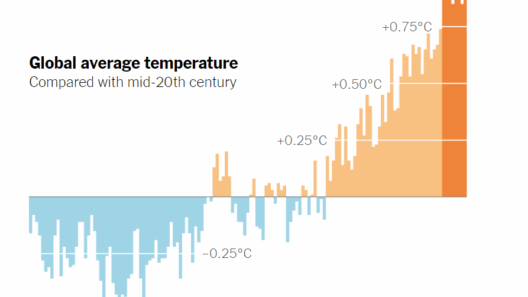Global warming poses a looming threat to our planet, influencing weather patterns, melting ice caps, and endangering countless species. As stewards of the Earth, it is imperative that individuals take proactive steps to mitigate this dire issue. This call to action outlines various avenues through which you can effectuate positive change today.
Firstly, reducing your carbon footprint is an essential initial step. Carbon emissions from personal vehicles contribute significantly to atmospheric CO2 levels. Opting for alternative modes of transportation, such as public transit, biking, or walking, can drastically decrease individual emissions. If driving is unavoidable, consider carpooling or investing in an electric vehicle, which dramatically lowers greenhouse gas emissions compared to traditional combustion engines. Moreover, telecommuting presents another viable solution, reducing both the time spent in traffic and the associated emissions.
Moreover, energy consumption within your household can be optimized. Simple measures, such as switching to energy-efficient bulbs and unplugging devices when not in use, can appreciably decrease your energy consumption. The incorporation of smart thermostats can further enhance energy efficiency by allowing you to regulate heating and cooling dynamically. Additionally, consider investing in renewable energy options. Solar panels, while a larger initial investment, can result in substantial long-term savings and provide a clean alternative to fossil fuels.
Another paramount strategy involves the consumption patterns related to food. The agriculture sector is a significant contributor to global emissions, particularly through meat and dairy production. Reducing meat intake, particularly red meat, can have a more profound impact than one might expect. Adopting a plant-based diet or designating specific meat-free days can facilitate considerable reductions in one’s carbon footprint. Furthermore, supporting local agriculture by buying locally sourced produce not only helps reduce transport emissions but also bolsters the local economy.
As you delve further into sustainable practices, consider the ramifications of waste. The world generates millions of tons of waste annually, with plastic products posing one of the gravest environmental hazards. Creating a minimal waste lifestyle requires conscious effort. Start by utilizing reusable shopping bags and containers. Additionally, partake in composting organic waste to diminish landfill contributions. Engage in initiatives that promote recycling and advocate for policies designed to limit single-use plastics in communities. Collective action through grassroots movements can effect significant policy changes in waste management.
Further, it is vital to engage in educational endeavors. Knowledge is a powerful catalyst for change. Stay informed about the latest climate science and environmental policies. Share this information within your community, fostering discussions that spur action and awareness. Organize or participate in workshops that educate others on sustainable practices. Engaging with local organizations focused on climate advocacy can amplify your impact, transforming individual action into a collective movement.
In addition, it is important to advocate for systemic changes. Individuals can exert considerable influence by supporting environmentally conscious policies and leaders. Participate in local elections, ensuring elected officials prioritize climate issues. Contact your representatives to express your concerns about climate policies and advocate for legislative changes that promote sustainability. Undoubtedly, systemic change is imperative in addressing the scale of global warming; grassroots efforts can compel governmental action.
Volunteering your time contributes substantially to community resilience against climate change. Numerous organizations operate on the frontlines, addressing climate issues through direct action, education, and policy advocacy. Whether engaging in tree-planting initiatives, participating in clean-up drives, or assisting in educational outreach, your efforts can have a profound and restorative impact. The act of volunteering fosters a sense of community, reinforcing the notion that collaborative efforts yield greater results.
Social media can also serve as a platform for advocacy. Utilize your social media presence to disseminate information about climate change and sustainable practices. Share your personal journey towards sustainability, inspiring others to reflect upon their consumption and lifestyle habits. Hashtags related to climate action can help unite individuals under a shared cause, amplifying the message and encouraging engagement. By fostering a vibrant online community, the call to action transcends geographic limitations.
Importantly, supporting eco-friendly products and businesses can stimulate a market that prioritizes sustainability. Seek out companies that adopt green practices, from sustainable sourcing to ethical labor practices. Purchasing eco-conscious products is a vote for environmentally responsible business practices, driving the economy toward more sustainable options. Furthermore, consider the lifecycle of the products you consume; prioritizing quality and longevity over fast consumption can contribute to a more sustainable future.
Finally, do not underestimate the importance of mental resilience. The challenge of climate change can often feel overwhelming, precipitating feelings of despair. Cultivating a mindset of hope and action is fundamental. Acknowledge the enormity of the issue, but recognize that incremental changes can lead to significant impacts. By focusing on what can be done rather than what cannot, individuals can foster a proactive approach that encourages persistence. Celebrate small victories along the journey toward sustainability, and inspire others to envision a thriving, verdant future.
In conclusion, global warming is not an insurmountable obstacle, but rather, an opportunity for transformative action. By curbing personal consumption, advocating for systemic change, and engaging in community efforts, individuals can significantly contribute to the larger fight against climate change. Every action counts; together, we can forge a resilient path toward a sustainable future.







